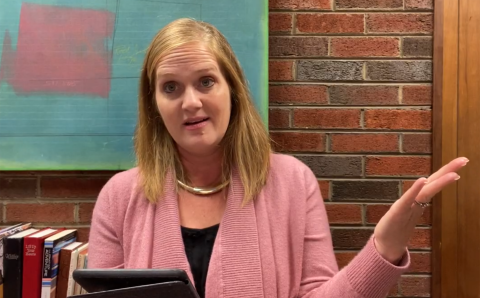Like the best questions, the answer to “Should our beliefs evolve?” is “It depends.” Let me give three different reasons beliefs might change. I acknowledge that for many the term “evolve” seems loaded. So here, let’s just assume it means “change.”
The first reason beliefs might change is simply for the sake of change, like the student who tries to justify her viewpoint to their teacher with nothing more than, “Because it’s 2021!” If your beliefs change for no other reason than for them to change, you should ask yourself whether it’s Jesus you’re really following or if you’re just chasing the fantasy called change.
A second and more serious reason for a change in beliefs is because it’s a natural process of human maturation. James Fowler (1940-2015) was an American theologian who proposed that faith formation goes through normal developmental stages similar to the cognitive stages of human development proposed by psychologist Jean Piaget.
Seen in this light, changes in beliefs that a child experiences as they become a teenager or that a teenager experiences as they graduate from university or that those in midlife experience are all part of normal human growth. Beliefs, like physical stature or emotional awareness or symbolic thought, mature through life. Fowler’s theory offers a compelling explanation for why our beliefs often change.
A third reason beliefs might change is because of changes in knowledge and understanding in the world around us. I recognize that this might be a challenging, perhaps unwelcome idea, but we need to name it and engage it thoughtfully.
Let’s be honest: We no longer believe that the Bible requires a geocentric view of the universe. We no longer believe slavery is acceptable. Many no longer believe that playing baseball on Sunday is inherently sinful. In our own lifetimes, our views on women working outside the home or serving in church leadership have changed. Beliefs change, sometimes because of increased knowledge of the world around us.
This can be challenging because there is a way of hearing and understanding this that’s no different from the first reason—change for the sake of change. We look around, see what others are doing in 2021, and change our beliefs to be “up to date” with everyone else. This is often called compromise or syncretism, but that’s not what I’m getting at here. I’m getting at how our beliefs legitimately change for weighty reasons that come to us from the world around us and cause us to take another look at beliefs (often rooted in the interpretation of Scripture) with fresh eyes.
Changes in our understanding of the solar system and the universe caused us to realize that sometimes ancient biblical authors used figures of speech that were never meant to be taken as literal proof that the earth is the center of the universe. For others, key social movements of the past 50 years have forced them to recognize as if for the first time that the apostle Paul was overthrowing ideas of ethnic superiority rather than providing their theological justification, causing a revolution in their beliefs on race.
Clearly, there are a range of contentious issues related to this. Just look at the topics synodical study committees have been addressing during the past few years. These complex questions demand the difficult work of faith-filled discernment, not simplistic sound bites that sidestep debate, even if wrapped in pious language.
Should our beliefs change? Scripture affirms that God’s posture toward us in Jesus Christ is constant and unchanging (Heb. 13:8), but the witness of church history is that our understandings and interpretations of our faith do change for important and legitimate reasons. Maybe it’s because God is unwaveringly committed to us that we don’t need to be afraid of beliefs evolving.
About the Author
Michael Wagenman is the Christian Reformed campus minister at Western University in London, Ont., where he invites undergraduate students to put their faith into loving service and mentors graduate students. His most recent book is The Power of the Church: The Sacramental Ecclesiology of Abraham Kuyper (Wipf &Stock, 2020).








